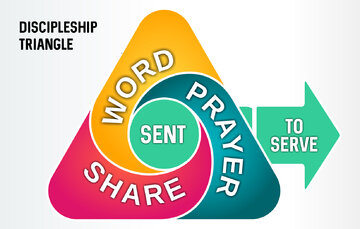Checklist for Launching one or Many pods or A discipleship learning community (DLC)
Solve the tech
For online pod meetings, choose an online platform such as Zoom.
Have someone ready to help people use it on their computer or phone.
Encourage your leaders to calmly dispel people’s anxiety about using tech.
To launch one pod
How long will you meet? 7 weeks with the option of continuing? 10 weeks? A school year?
Where or how will you meet?
6 feet apart in a room,
or time online with Zoom,
or in a park or in the yard,
where social distancing isn’t hard.
Will the pod study a particular subject or passages in scripture?
Who are potential pod members? Who will invite them, when and how?
When a person agrees to join the pod send them the dates and the pod agreements.
During the first meeting explain the concept of the open chair and of the Word-Share-Prayer meeting model.
To launch multiple independent pods
Invite people into pods and publicly invite everyone in the pod to sign up for a pod.
Multiple study options may be offered, general Bible study topics and topics relative to specific interests such as women, men, youth, family life, work-life and so on.
Begin a Pod Leader Ministry Team that meets monthly or quarterly for mutual encouragement, training and planning. This also keeps the pods connected to the broader congregation.
Launching multiple pods through a Discipleship Learning Community (DLC)
A Discipleship Learning Community is the combination of a class and pods or a worship service and pods. After the class or worship service, the people meet in pods with the same people for another 45 minutes. This can be done online with platforms such as Zoom very easily.
Who will the teacher-leader be? Or the leader who will arrange for the teaching (live or by video) for each meeting?
Will the teaching be based on biblical texts or around a topic or topics?
Who will be the initial pod leaders, and apprentice pod-leaders?
When will the DLC meet? Generally. this will take 1.5 hours - class plus pods although it will typically take and hour and three fourths if this model is used with the congregation’s worship service.
Who will work out the Tech? Using on online service such as Zoom, work out how invitations will be sent ever week and how to use Zoom for the large group portion and how to move people into their pods.
When will the pod leaders and apprentice leaders meet in a monthly or quarterly Pod Leader Ministry Team for mutual encouragement, training and planning?
Equip each pod leader with pod agreements, the Word-Share-Prayer format, the concept of the empty chair and the value of multiplication if and when the pod grows to ten or more members.
Launching online pods Sunday morning after worship
Zoom type of online platforms allow breakout groups to meet after the large group gathering. When a guest indicates interest in joining an after church pod, the Zoom coordinator may assign that guest to a pod with an open chair or to a pod designed specifically to host new people.
Use your time in an after-worship pod using the Word-Share-Prayer format. Everyone may speak of their key insight from the morning sermon or their own top insight from the biblical text. Then each person takes a little time to share blessings and needs in their lives followed by the pod members praying for one another.
The Christian pattern of a base and a field?
“The effective Christian pattern is always a base and a field. The base … is the center to which the [people] of Christ repair, periodically, for new strength. The field is the world, and this is where Christians are supposed to operate...The society of a little group of fellow believers can be so pleasant that the poverty and the sorrow of the outside world are forgotten, at least for the time of meeting. But the poverty and the sorrow must never be forgotten, not even for a little while. A prayer group which does not make its members more effective apostles in their jobs and homes, and more sensitive participators in the fellowship of those who bear the mark of frustration, is essentially a failure. The test of the vitality of a group does not occur primarily while the group is meeting; it occurs after the meeting is over.” Elton Trueblood, The Company of the Committed (New York: Harper & Row Publisher, 1961), pp. 74-75.



